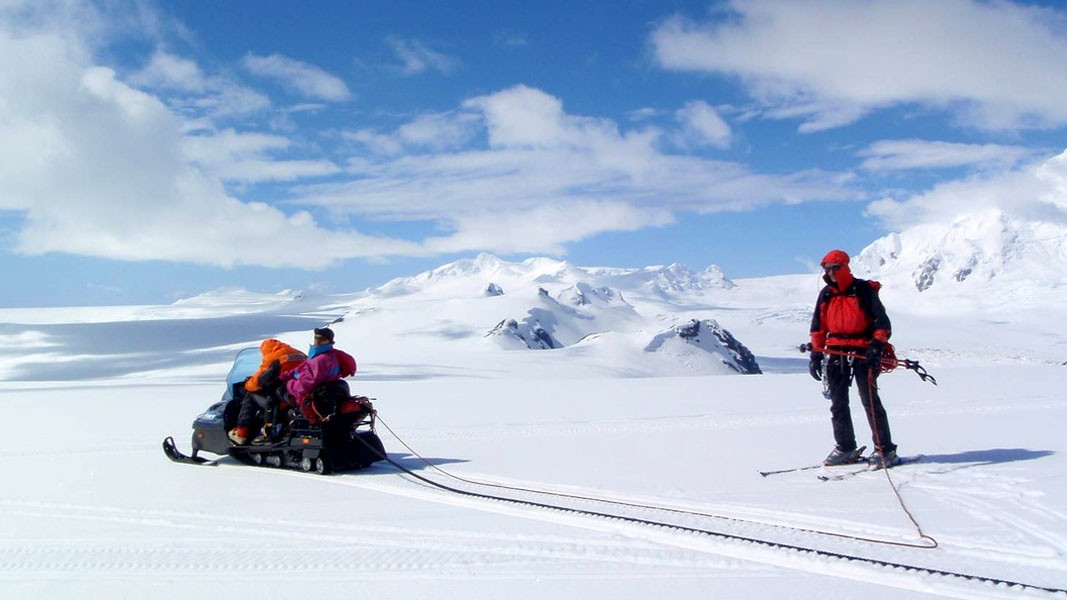Radio Bulgaria already told you about Bulgarian musicians Theodosii Spassov and Hristian Tsvyatkov who made their first musical recordings on Antarctica. Now we would like to take a look at another Bulgarian innovation in the research carried out on the Frozen Continent. Surprisingly, it is the work of a person who has no scientific background.
 Iglika Trifonova is a Bulgarian photographer and journalist who has been part of the Bulgarian Antarctic expeditions for the fifth time now.
Iglika Trifonova is a Bulgarian photographer and journalist who has been part of the Bulgarian Antarctic expeditions for the fifth time now.
„This is my first expedition on which I work on my own project – a sociological study of human relations in this special form of community that takes shape on the Antarctic. I will make interviews, keep a diary, and also study people via various sociological methods”, says Iglika about her plans. “This is a scientific project with the Fund for Scientific Research at the Sociology Department of Sofia University Saint Kliment Ohridski. I am part of the team which will gather the information as in the processing of the data I will be assisted by my colleagues from the sociology department. The idea is to turn this project into my doctoral thesis.”
This is the first time that such a sociological survey is being conducted in the Bulgarian Antarctic base and there are no reports of other sociologists having worked on the White Continent until now. As to the idea itself, Iglika Trifonova explains:

„Yes, the idea belongs entirely to me because it was from my very first visits there that I noticed how much people change when they set foot on the Antarctic. The community which is created there is an extremely family type of socializing. This has been my second family for so many years now.”

Although the people working in the base change, the general atmosphere remains the same, as well as the friendship between them and the sense of one family, so when back to Bulgaria they continue to meet and keep in touch. This "Antarctic" society stays strong not only there, so Iglika Trifonova is eager to study it:
“Psychology studies how people cope under extreme conditions while sociology examines relationships between people and how this community takes shape, what gives rise to this successful form of human society which has its own rules of conduct and continues to observe them long after all its members have left these extreme conditions”.
There are strict rules governing life in the Bulgarian Antarctic base St. Kliment Ohridski – written and unwritten. They determine how the base works, how the scholars give their shifts, who is responsible for what, how people should behave when going outside the work base, etc.

How are conflicts resolved in the polar base and who takes the tough decisions for resolving them – this will also be examined in Iglika Trifonova’s study.
The 28th Bulgarian Antarctic Expedition will finish in March, but the musicians Theodosii Spasov and Hristian Tsvyatkov as well as Iglika Trifonova and Prof. Hristo Pimpirev are expected to return to Bulgaria by the end of February.
English Rossitsa Petcova
Photos: bai-bg.weebly.com and Assia ChanevaSummer in Bulgaria is an exciting time, not only for tourists. June and July are intense months for young people finishing secondary school and about to take the next step in their lives by choosing a university and a career path. In recent years,..
Colourful, ethereal, and subtle, butterflies are everywhere around us – day and night, in the city and in the countryside. However, zoologists warn that their butterfly dance has become increasingly rare in recent years in European countries , including..
The consulates of a country abroad are usually seen simply as the place where citizens go when they need assistance—whether to obtain documents or resolve problems that arise during their stay in a foreign country or in the event of a natural disaster...
Velingrad once again invites all fans of Bulgarian folklore to join in a traditional horo chain dance near the town's famous mineral springs. On July..
Until July 13, 2025, Hisarlaka Park near the town of Kyustendil is welcoming thousands of tourists, adventurers and history enthusiasts.The fifth..
The 10th anniversary edition of the Raspberry Festival was officially opened on July 11 in the town of Samokov. The event continues on Saturday, July..

+359 2 9336 661
